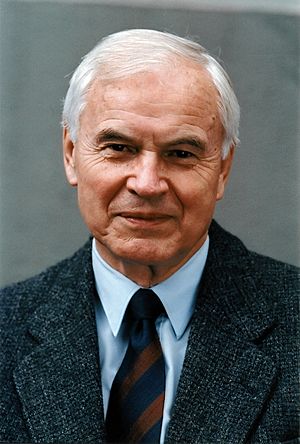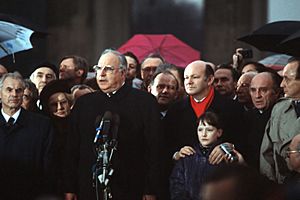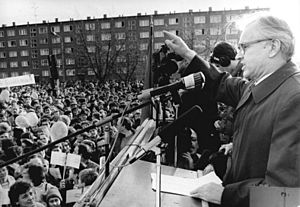Hans Modrow facts for kids
Quick facts for kids
Hans Modrow
|
|||||||||||||||||||||||||||||||||||
|---|---|---|---|---|---|---|---|---|---|---|---|---|---|---|---|---|---|---|---|---|---|---|---|---|---|---|---|---|---|---|---|---|---|---|---|

Modrow in 1999
|
|||||||||||||||||||||||||||||||||||
| Chairman of the Council of Ministers of East Germany | |||||||||||||||||||||||||||||||||||
| In office 13 November 1989 – 12 April 1990 |
|||||||||||||||||||||||||||||||||||
| Head of state | Egon Krenz Manfred Gerlach Sabine Bergmann-Pohl (interim) |
||||||||||||||||||||||||||||||||||
| Deputy | Christa Luft Peter Moreth Lothar de Maizière |
||||||||||||||||||||||||||||||||||
| Preceded by | Willi Stoph | ||||||||||||||||||||||||||||||||||
| Succeeded by | Lothar de Maizière (Minister-President) | ||||||||||||||||||||||||||||||||||
| First Secretary of the Socialist Unity Party in Dresden |
|||||||||||||||||||||||||||||||||||
| In office 3 October 1973 – 15 November 1989 |
|||||||||||||||||||||||||||||||||||
| Preceded by | Werner Krolikowski | ||||||||||||||||||||||||||||||||||
| Succeeded by | Hansjoachim Hahn | ||||||||||||||||||||||||||||||||||
| Chairman of the Council of Elders of The Left |
|||||||||||||||||||||||||||||||||||
| In office 12 December 2007 – 10 February 2023 |
|||||||||||||||||||||||||||||||||||
| Deputy | Christina Emmrich Wolfgang Grabowski |
||||||||||||||||||||||||||||||||||
| Preceded by | Position established | ||||||||||||||||||||||||||||||||||
|
|||||||||||||||||||||||||||||||||||
| Personal details | |||||||||||||||||||||||||||||||||||
| Born | 27 January 1928 Jasenitz, Province of Pomerania, Free State of Prussia, Weimar Republic (now Jasienica, Poland) |
||||||||||||||||||||||||||||||||||
| Died | 10 February 2023 (aged 95) Berlin, Germany |
||||||||||||||||||||||||||||||||||
| Political party | The Left (2007–2023) | ||||||||||||||||||||||||||||||||||
| Other political affiliations |
Party of Democratic Socialism (1989–2007) Socialist Unity Party (1949–1989) |
||||||||||||||||||||||||||||||||||
| Spouse |
Annemarie Straubing
(m. 2003) |
||||||||||||||||||||||||||||||||||
| Children | 2 | ||||||||||||||||||||||||||||||||||
| Alma mater | Parteihochschule Karl Marx Hochschule für Ökonomie Berlin Humboldt-Universität zu Berlin (Dr. rer. oec.) |
||||||||||||||||||||||||||||||||||
| Occupation |
|
||||||||||||||||||||||||||||||||||
Hans Modrow (born 27 January 1928 – died 10 February 2023) was a German politician. He is best known as the last leader of East Germany who was part of the Communist government.
He took office during a time of big changes in East Germany, known as the Peaceful Revolution. He was the main leader of the country for several months in late 1989 and early 1990. He helped prepare the way for the first free elections in East Germany's history. He also brought many politicians from opposition groups into his government.
After Germany became one country again, he continued to be involved in politics. He was an honorary chairman of the Party of Democratic Socialism (PDS). Later, he led the "council of elders" for the Left Party from 2007.
Contents
Early Life and Education
Hans Modrow was born on 27 January 1928. His birthplace was Jasenitz, in a part of Germany called Pomerania. This area is now part of Poland. As a child, he was a leader in the Hitler Youth, a youth group in Germany at that time. He also went to a local school.
From 1942 to 1945, he trained to be a machinist. In January 1945, he briefly served in the Volkssturm, a German defense force. Soon after, in May 1945, Soviet soldiers captured him as a prisoner of war. He was sent to a POW camp near Moscow.
While in the camp, he learned about Marxism-Leninism, a political idea. He found this new way of thinking interesting. After he was released in 1949, he worked as a machinist. In the same year, he joined the Socialist Unity Party (SED). This was the ruling party in East Germany.
From 1949 to 1961, Modrow worked for the Free German Youth (FDJ). This was a youth organization in East Germany. He also studied at a college in Moscow in 1952 and 1953. He later earned degrees in social science and economics from universities in Berlin.
Political Career in East Germany
Modrow had a long career in politics in East Germany. He was a member of the Volkskammer, which was the East German parliament, from 1957 to 1990. He was also part of the SED's Central Committee, a powerful group within the party.
From 1961 to 1967, he led the SED in Berlin-Köpenick. He also worked in the party's propaganda department. He received important awards, like the Patriotic Order of Merit in gold in 1975. In 1978, he received the Order of Karl Marx.
Starting in 1973, he became the top SED leader in Dresden. This was East Germany's third-largest city. He was known for sometimes disagreeing with Erich Honecker, who was the long-time leader of the SED. Modrow also made important connections with the Soviet Union. This included Mikhail Gorbachev, who later became the Soviet leader.
Modrow supported Gorbachev's ideas for reform, called glasnost and perestroika. These ideas aimed to make the Soviet system more open and modern.
Peaceful Revolution and Leadership
During the Peaceful Revolution in 1989, many people in East Germany protested against the government. On 4–5 October, Modrow ordered security forces to handle a large protest in Dresden. This led to many people being arrested.

When Erich Honecker was removed from power on 18 October, Modrow became the new premier on 13 November. This happened just four days after the Berlin Wall fell. The SED party officially gave up power on 1 December. Because the premier was the highest state job, Modrow became the main leader of East Germany.
The secret police, known as the Stasi, was a very powerful organization. Modrow tried to change its name and purpose. However, public pressure and opposition groups pushed for the Stasi to be completely shut down. It was finally dissolved in January 1990. The Modrow government also ordered the destruction of some Stasi files.
On 7 December 1989, Modrow agreed to hold free elections within six months. These elections were later moved forward to 18 March 1990. By this time, the SED party had changed its name to the "Party of Democratic Socialism" (PDS).
Modrow wanted a slow process for Germany to reunite. He suggested a three-step plan for a neutral German confederation. He did not want a quick reunification with capitalist West Germany. However, the East German government and economy were weakening. This allowed West German Chancellor Helmut Kohl to push for a faster reunification.
From 5 February 1990, Modrow included eight members from opposition parties in his government. On 13 February 1990, Modrow met with West German Chancellor Helmut Kohl. Modrow asked for a large loan, but Kohl refused. Modrow remained premier until the elections on 18 March 1990.
Life After Reunification
After German reunification, Hans Modrow continued his political career. He served as a member of the Bundestag, which is the German parliament, from 1990 to 1994. He was also a member of the European Parliament from 1999 to 2004.
He wrote several books about his political experiences. He continued to hold his Marxist political views. He also expressed disappointment about the end of the Eastern Bloc, a group of communist countries. He believed that Gorbachev's reforms had weakened the economy of the Eastern Bloc.
In 2006, he said that West Germany was responsible for the deaths at the Berlin Wall. He also defended the building of the wall, saying it was needed to prevent a third World War. He called East Germany an "effective democracy."
Modrow passed away on 10 February 2023, at the age of 95.
Images for kids
See also
 In Spanish: Hans Modrow para niños
In Spanish: Hans Modrow para niños
 | James B. Knighten |
 | Azellia White |
 | Willa Brown |





